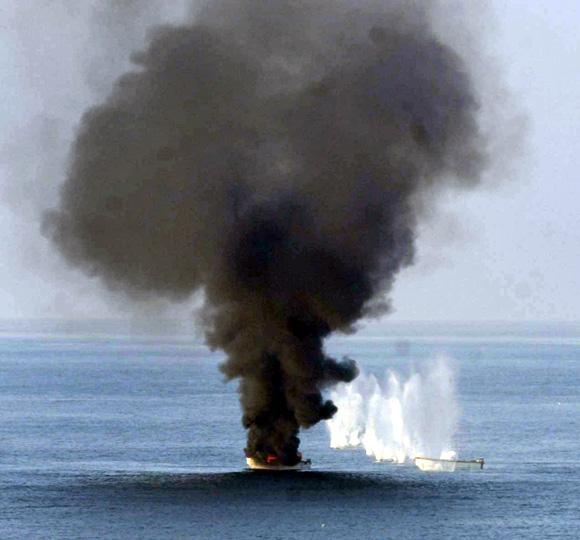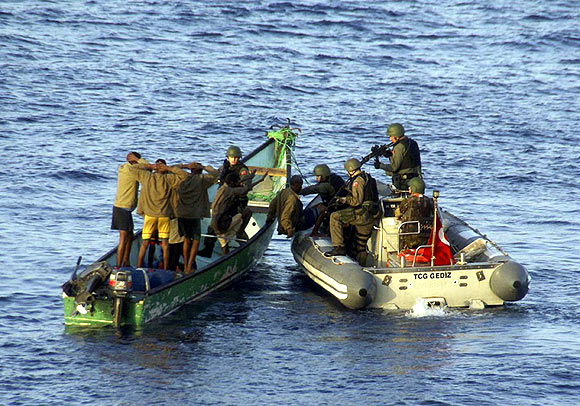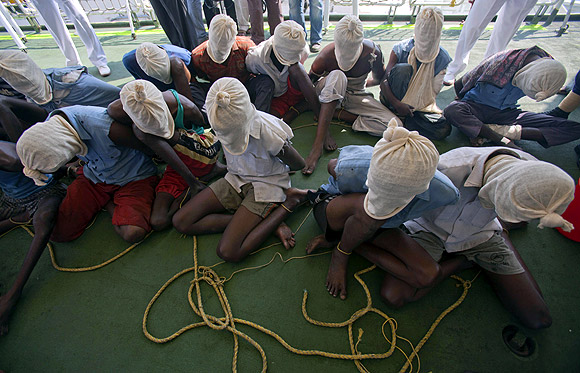Photographs: Navy handout/Reuters
Pirate attacks worldwide has witnessed a sharp decline in the first half of 2012 as international naval efforts played a key role in "frustrating" the menace posed by Somali pirates, a global maritime watchdog said on Monday.
Overall, 177 incidents of sea piracy were reported in the first six months of 2012, compared to 266 incidents for the corresponding period in 2011, the International Maritime Bureau said in a report warning that these numbers were offset by a worrying increase of attacks in the Gulf of Guinea.
The report showed 20 vessels were hijacked worldwide, with a total number of 334 crewmembers taken hostage. There were a further 80 vessels boarded, 25 vessels fired upon and 52 reported attempted attacks. At least four crewmembers were killed.
...
In 2012, pirates find themselves in troubled waters
Image: Marines from NATO's Turkish frigate Gediz arrest suspected pirates on their skiff in the Gulf of Aden September 26, 2009Photographs: Reuters
The decrease in the overall number is primarily due to the decline in the incidents of Somali piracy activity, dropping from 163 in the first six months of 2011 to 69 in 2012. Somali pirates also hijacked fewer vessels, down from 21 to 13. Nonetheless, Somali piracy continues to remain a serious threat.
"Somali pirate attacks cover a vast area, from the Southern Red Sea, Gulf of Aden, and Gulf of Oman to the Arabian Sea and Somali Basin, threatening all shipping routes in the north west Indian Ocean," said Pottengal Mukundan, Director of IMB, which has been monitoring world piracy since 1991.
In 2012, pirates find themselves in troubled waters
Image: A small boat being towed by a suspected pirate mothership is destroyed February 2, 2011 by weapons fire from the guided-missile destroyer USS MomsenPhotographs: Reuters
The IMB Piracy Reporting Centre remains the world's only manned centre to receive and disseminate reports of piracy and armed robbery 24 hours a day across the globe.
The report, in part, has attributed the noticeable decline in Somali piracy to the pre-emptive and disruptive counter piracy tactics employed by the international navies. This includes the disruption of mother vessels and Pirate Action Groups.
In 2012, pirates find themselves in troubled waters
Image: Suspected Somali pirates sit with their faces covered with cloth sacks on the deck of an Indian Coast Guard vessel in MumbaiPhotographs: Vivek Prakash/Reuters
"The naval actions play an essential role in frustrating the pirates. There is no alternative to their continued presence," said Mukundan.
The effective deployment of Best Management Practices, ship hardening and, in particular, the increased use of Privately Contracted Armed Security Personnel, has also contributed to the falling numbers.
As of 30 June 2012, Somali pirates were still holding 11 vessels and 218 crew, 44 of whom were being held ashore in unknown locations and conditions.
In 2012, pirates find themselves in troubled waters
Image: A Kenyan artist paints an anti-pirate graffiti on a wooden board at the sprawling Kibera slums in Kenya's capital NairobiPhotographs: Vivek Prakash/Reuters
The decline in Somali piracy, however, has been offset by an increase of attacks in the Gulf of Guinea, where 32 incidents, including five hijackings, were reported in 2012, versus 25 in 2011.
The report emphasised that high levels of violence were also being used against crewmembers in the Gulf of Guinea. Guns were reported in at least 20 of the 32 incidents. At least one crewmember was killed and another later died as a result of an attack.






article